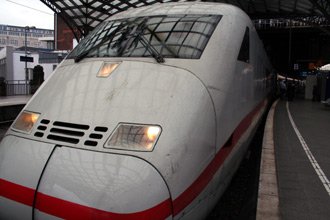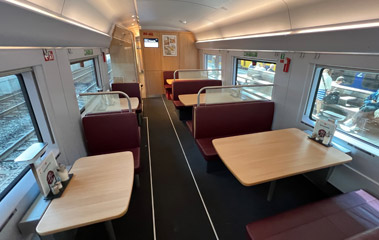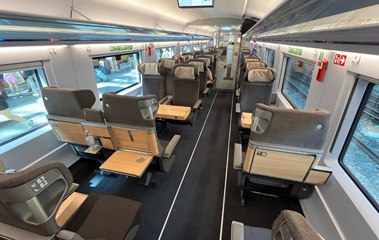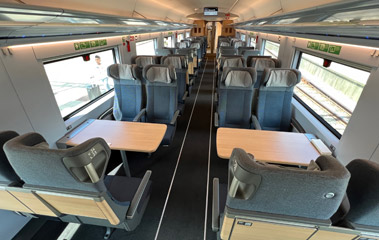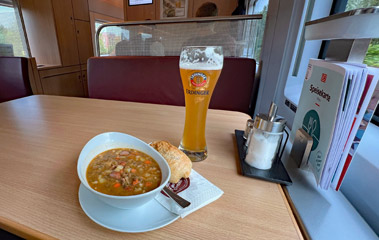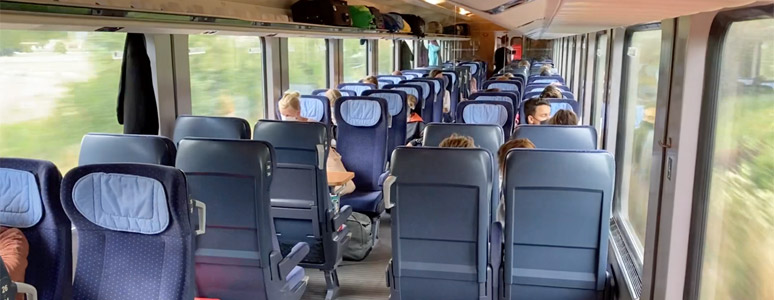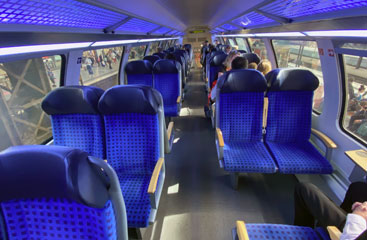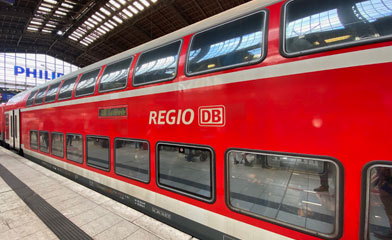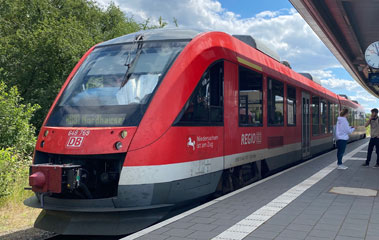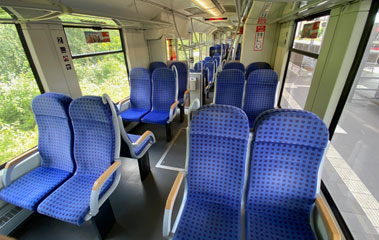|
Germany by train. There's no check-in, walk into the station, glance at the indicator board to find your train & hop on, any time before departure... |
|
Buy German train tickets online direct from DB at int.bahn.deBuy direct from Deutsche Bahn with no booking fee. Tip: Register when prompted so you can log in and check or re-print your tickets at any time. |
|
|
|
Inter-city train tickets from €12.99
Deutsche Bahn (German Railways) high-speed IC and ICE trains are easily the best way to travel between major town & cities all over Germany, in comfort at ground level. DB's ICE trains travel at up to 186 mph from city centre to city centre, and if you pre-book direct with the operator you can find some really cheap fares.
Train travel in Germany
![]() DB's discount card: Bahncard25, Bahncard 50
DB's discount card: Bahncard25, Bahncard 50
![]() Deutschlandticket - €63 for a month on
regional trains
Deutschlandticket - €63 for a month on
regional trains
![]() Quer-durchs-Land-Ticket:
€51 for 1 day regional travel
Quer-durchs-Land-Ticket:
€51 for 1 day regional travel
![]() Lander tickets: Unlimited train travel in one
region
Lander tickets: Unlimited train travel in one
region
![]() Bayern Ticket: €34 for
1 day unlimited travel in Bavaria
Bayern Ticket: €34 for
1 day unlimited travel in Bavaria
![]() Schönes-Wochenende-Ticket: discontinued
Schönes-Wochenende-Ticket: discontinued
![]() Maps of the German rail network
Maps of the German rail network
![]() What are German
trains like? ICE, IC, R/RB/RE, sleepers
What are German
trains like? ICE, IC, R/RB/RE, sleepers
![]() Travel tips: Luggage, food & drink, lounges...
Travel tips: Luggage, food & drink, lounges...
![]() How to
visit Neuschwanstein
Castle
How to
visit Neuschwanstein
Castle
![]() How to visit the Harz steam railway & Brocken
How to visit the Harz steam railway & Brocken
![]() How to visit Obersalzberg & Eagle's Nest
How to visit Obersalzberg & Eagle's Nest
![]() Useful country information:
currency, dial code...
Useful country information:
currency, dial code...
![]() Holidays & short breaks by train
Holidays & short breaks by train
![]() Travel insurance, mobile data, VPN & other
tips
Travel insurance, mobile data, VPN & other
tips
![]() Hotels convenient for arrival by train
Hotels convenient for arrival by train
International trains to/from Germany
![]() Trains from other European
cities to Germany
Trains from other European
cities to Germany
![]() Trains from Berlin
to other European cities
Trains from Berlin
to other European cities
![]() Trains from Hamburg
to other European cities
Trains from Hamburg
to other European cities
![]() Trains from Cologne &
Düsseldorf to other cities
Trains from Cologne &
Düsseldorf to other cities
![]() Trains from
Frankfurt to other European cities
Trains from
Frankfurt to other European cities
![]() Trains from Munich
to other European cities
Trains from Munich
to other European cities
Station guides
![]() Berlin Hbf
Cologne Hbf
Frankfurt (Main) Hbf
Berlin Hbf
Cologne Hbf
Frankfurt (Main) Hbf
General train travel information
![]() General European train travel
information
General European train travel
information
![]() Eurail passes &
Interrail passes
Eurail passes &
Interrail passes
Useful country information
How to check train times & buy tickets
-
To check times & buy tickets, go to the German Railways website int.bahn.de.
Anyone from any country can use bahn.de, international credit cards are accepted, you print your own ticket or can show it on your phone. I recommend registering when prompted, so you can log in, check all your bookings and re-print your tickets at any time. Tips for using Bahn.de.
Do you need to book in advance?
-
No, for regional trains - the ones marked R, RE, M, ALX & so on in the search results on int.bahn.de. Regional trains have one fixed price with unlimited availability and no reservations necessary or possible. Treat them as you would a city metro: Turn up, buy a ticket and hop on the next train. They cannot 'sell out'! If you're making multiple journeys, there are some regional train passes explained here.
-
No, for longer distance trains - the ones marked IC, ICE, EC and so on in the search results on int.bahn.de - if you are happy paying the relatively expensive Flexpreis = fully-flexible standard price. These full-fare tickets have a fixed price (although DB now vary the cost slightly depending how busy/popular that day is likely to be), unlimited availability and cannot sell out. they are valid on any train that day, a seat reservation isn't necessary but can be made as an 'optional extra' for €5.50 2nd class or €6.90 1st class, per seat per journey (a journey might mean more than 1 train, for one fee).
-
Yes, for longer distance trains if you want to save money with cheap advance-purchase fares - cheap Sparpreis (saver) advance-purchase fares are offered if you book in advance, this which varies from €12.99 upwards depending how far ahead you book and how popular that train, day or date is. If you buy one of these cheap fares you can only travel on that specific train, limited refunds and no changes to travel plans.
-
For example, Frankfurt to Berlin costs over €125 with a Flexpreis if you buy on the day of travel, but starts at just €17.99 upwards (meaning it could be €17.99, €29.99, €49.99, €69.99, whatever) if you book in advance. So book ahead!
When does booking open?
-
Booking opens up to 12 months ahead for German domestic tickets.
-
It was increased to 6 months from the previous 92 days in 2016, and to 12 months in 2024. However, the booking period is often less than this for dates immediately after the timetable changes at midnight on the 2nd Saturday in December. Bookings for dates after the mid-December timetable change, including the Christmas period, usually open in mid-October.
Flexpreis or Sparpreis?
-
If you use int.bahn.de to book a long-distance train it initially shows the cheapest fare available against each train.
If you click on that fare, you'll then see a range of fares, Super Sparpreis, Sparpreis & Flexpreis.
-
Flexpreis is the full-price flexible fare. A Flexpreis ticket can be bought online or at the station on the day of travel, the price in fact varies slightly on different dates, but not by a huge amount. They are refundable, good for any train that day.
-
Sparpreis & Super Sparpreis fares are limited-availability advance-purchase fares, from €12.99, €19.99, €29.99, €39.99 and so on, the price varies depending how far ahead you book and how popular that date, day and train is. Spar is German for save.
Sparpreis & Super Sparpreis fares only allow travel on the specific trains you book. This is called Zugbindung, literally train-binding, but if your journey involves a connecting Regional or S-Bahn train (R, RB, S) you can use any such train on that part of your journey. More about Zugbindung.
Super Sparpreis = no refunds, no changes. Sparpreis fares are refundable (although for a DB credit voucher, not cash) up to the day before departure with a small fee deducted, no changes or refunds allowed from the day of departure onwards.
-
Seat reservations are usually optional: You can board the train and sit in any empty unreserved seat, or on long distance trains such as IC, ICE & EC you can optionally reserve a seat for a small extra charge, €5.50 2nd class or €6.90 1st class. An LED display on or above each seat shows which seats are reserved and which free. I recommend reserving a seat for any longer distance journey, as trains can get busy.
- Children go free! On DB trains, children under 6 go free, no ticket needed. Children over 6 but aged under 15 also go free if they travel accompanied by a fare-paying adult, a great offer. Book your tickets at int.bahn.de and it will work all this out for you.
Tips for using int.bahn.de
-
See tips for using int.bahn.de, including how to use the Stopovers and Transfer time features.
-
Alternatives to bahn.de: Bahn.de is one of the best train operator sites, but if for any reason you want an alternative site which can also book DB trains at DB prices, try these two:
Raileurope.com has a direct connection to DB's ticketing system so it sells the same trains, same prices, same print-at-home tickets at Bahn.de, but with a small booking fee. It accepts all international credit cards so can be used by anyone from any country. Raileurope.com also connects to the French, Italian & Spanish ticketing systems so can easily book multi-operator journeys such as Munich to Naples (which involves DB and Trenitalia) or Frankfurt to Bordeaux (which involves DB and SNCF). Raileurope.com is also capable of splitting the booking to book some cross-Germany journeys (for example, Brussels to Poland) for which you'd have to manually split the booking at some logical point within Germany if you wanted to use bahn.de.
Thetrainline.com also has a connection to DB's system, so can sell print-at-home tickets (but not those which need to be posted) for DB train at the same prices as DB, but with a small booking fee.
Competing lo-cost operator: Flixtrain
-
Almost all long-distance trains in Germany are operated by Deutsche Bahn (DB), the State-owned German Federal Railways. But there is now one other long-distance operator worth mentioning.
-
Lo-cost operator Flixtrain (www.flixtrain.com) runs one or more daily trains on the Berlin-Cologne-Heidelberg-Stuttgart route and the Cologne-Osnabrück-Hamburg route. One class only, no catering, but with low fares even at short notice. Book at www.flixtrain.com, or you can compare DB and Flixtrain prices together at www.thetrainline.com as this sells tickets for both operators.
Buy tickets by phone in the UK
-
If you live in the UK you can buy German train tickets direct from Deutsche Bahn on their English-speaking telesales line, 00 49 (0)30 311 68 29 04. Lines open 08:30-20:00 Monday-Friday, 09:00-13:00 Saturday & Sunday UK time, 1.5% fee for phone bookings.
Custom-made tours of Germany by train
-
Railbookers are a train travel specialist who can put together a tour of Germany for you as a package, including rail travel, hotels & transfers. On their website you'll find a range of suggested tours & breaks which can be varied or customised to your own requirements. And as you're booking a package, they'll take care of you if anything happens to one part of the itinerary such as a strike or delay. They now have offices in the UK, USA & Australia.
-
Tailor Made Rail can arrange tours of Germany by train, they have suggested itineraries or they can organise a trip based on your own requirements, they welcome complex itineraries! As it's a package, they'll take care of you if anything happens on one part of the trip, for example, a national strike. They're TTA-protected, which is similar to ATOL's protection for air travel.
Call their dedicated seat61 phone line 020 3778 1461 and quote seat 61 when booking. From outside the UK call +44 20 3778 1461. Lines open 09:00-17:30 Monday-Friday. Their website is www.tailormaderail.com/destinations/germany.
![]() UK call 0207 864 4600,
www.railbookers.co.uk
UK call 0207 864 4600,
www.railbookers.co.uk
![]() US call free 1-888-829-4775,
www.railbookers.com
US call free 1-888-829-4775,
www.railbookers.com
![]() Canada call 1-855-882-2910,
www.railbookers.com
Canada call 1-855-882-2910,
www.railbookers.com
![]() Australia call 1300 971 526,
www.railbookers.com.au
Australia call 1300 971 526,
www.railbookers.com.au
![]() New Zealand call 0800 000 554 or
see
website
New Zealand call 0800 000 554 or
see
website
DB's discount card: Bahncard
What are Bahncards?
-
DB has a range of discount cards called Bahncards. You buy a card and it gives discounts on normal fares for (in most cases) 1 year. It may justify the price even for one or two longer trips, especially if made close to departure date when fares would normally be expensive.
-
You get the discount on German domestic journeys, and on international journeys to, from or across Germany.
However, for international journeys the discount will not normally be the full 25% or 50% as the reduction is not necessarily applied to the part outside Germany (test it before buying a Bahncard to see what actual effect a Bahncard has - see my top tip below).
-
Man in Seat 61's top tip: Before buying a Bahncard, run an enquiry for the journeys you actually plan to make, using int.bahn.de (a) as normal and (b) with a Bahncard 25 or Bahncard 50 discount added. See what it does to prices. If you see no difference, the discount may not apply to your particular journey. If you see a difference, do the savings justify the cost of the card?
Types of Bahncard
-
Bahncard 25 (or 50) lasts for 1 year and gives 25% (or 50%) off Flexpreis (full-price), Sparpreis and Super Sparpreis (advance-purchase) fares. The Bahncard 25 is the range of cards overseas visitors should consider as savings may justify the cost even for just a few journeys to, from or within Germany.
-
Trial Bahncard 25 (or 50) lasts for 3 months, after which it is automatically renewed as a normal 1-year Bahncard 25 or 50 unless your subscription cancelled in writing at least 6 weeks before. The 25% (or 50%) discount can justify the cost even for one trip to Germany involving a few train rides, as long as you remember to cancel your subscription, giving at least 6 weeks notice.
-
Youth Bahncard 25 is a cheaper Bahncard 25 for travellers aged 6 to 18. It lasts 5 years, or until your 19th birthday, whichever is sooner.
-
My Bahncard 25 or 50 is a cheaper Bahncard for travellers aged under 27, it lasts 1 year.
-
Senior Bahncard 25 is a cheaper Bahncard 25 for older travellers aged 65 and over, lasting 1 year.
-
Bahncard 50 lasts 1 year and gives 50% off Flexpreis (full-price) fares and 25% off Sparpreis/Super Sparpreis (advance-purchase) fares. It costs several hundred euros so is only of use to regular travellers.
-
Bahncard 100 gives unlimited travel for a year, this costs thousands of euros.
-
Each type of Bahncard comes in a 2nd class version and a more expensive 1st class version, except Youth which is only available as 2nd class.
Check prices & buy a Bahncard
-
Check prices & buy online at www.bahn.com//en/offers/bahncard.
Anyone of any nationality can buy a Bahncard. After you buy, a hard-copy plastic Bahncard is posted to you at any address worldwide. However, you can also upload a digital Bahncard to the DB Navigator app and start using it immediately on your phone.
Tip: If you don't see the type of Bahncard you want in the English version, switch bahn.com to German for a full listing.
You can use your Bahncard to buy discounted tickets at int.bahn.de, www.thetrainline.com or www.raileurope.com.
-
Bahncards renew automatically each year unless your subscription is cancelled in writing at least 6 weeks before.
Special regional tickets
These one-day unlimited travel passes are well worth knowing about, even though they're not valid on fast long-distance trains, only on slower regional trains. If you want a railpass valid on all trains, including high-speed and long-distance ones, see the German Rail Pass section below.
Deutschland ticket
-
Unlimited travel on regional transport nationwide for €63 a month
Germany offers unlimited travel on regional transport nationwide for €63 per month (2026 price).
This is the successor to the popular (but temporary) €9 ticket created after the pandemic to address the cost-of-living crisis. Unlike the €9 ticket, the Deutschlandticket is a permanent product.
The Deutschland ticket is good for all regional trains run by DB and by other operators across the whole of Germany (marked R, RE, RB, IRE or S-Bahn in the timetable) and other types of local & regional transport including local buses, city buses, trams & U-Bahn.
It's even valid on the famous Harz Railway, including steam-hauled trains, but not on the branch line up the Brocken.
It's not valid on long-distance ICE & IC trains or similar long-distance trains classified EuroCity, Eurostar, TGV, Railjet, Westbahn, Flixtrain or Snälltåget. So yes, you could cross Germany with it if you wanted, but only using slower regional trains.
-
The Deutschland ticket only works in Germany
But there are a few cases where it's valid into neighbouring countries. For example, it's valid on cross-border regional trains to/from Salzburg in Austria, to/from Venlo, Arnhem, Hengelo & Enschede in the Netherlands, to/from Basel Bad Bf & Basel SBB in Switzerland, and to/from Zgorzelec in Poland. But only on regional trains (marked R, RE, RB, BRB and so on), not EC, RJ, RJX, IC or ICE long-distance trains or Westbahn (WB) trains.
-
Valid from the 1st of the month to the end of the month
Unlike normal passes or season ticket which can start on any date you choose, each month's Deutschland ticket is valid from the 1st of the month to the last day of the month. So if you bought one on 30 May, that would be a 'May' Deutschland ticket valid from 1 to 31 May and you'd only get 2 days use out of it, 30 & 31 May - but it would still cost €63!
-
Usually only sold as a rolling monthly subscription
It's aimed at commuters not tourists, so most vendors only sell Deutschland tickets as a rolling monthly subscription. You can cancel this subscription it at any time, even after paying for only 1 month, but most vendors require you to cancel before the 10th of the month to avoid paying for the following month's €63 Deutschland ticket. But read on...
-
If you only want a Deutschland ticket for one month
To enjoy a one month's unlimited travel on regional trains across Germany, you could set up a subscription and then cancel it before the 10th of the month, but it's easier to buy from the vendors suggested in options 1 or 2 below.
These two vendors sell Deutschland Tickets as a one-off payment with no need to cancel any subscription, so no danger of forgetting to cancel or missing the cancellation deadline and accidentally buying another month's ticket.
-
Children
As it's aimed at commuters, there's no child version and no provision to add children to your account. However, you can buy adult-rate Deutschland Tickets for your children using germanytransitpass.com as shown in option 1 below. This allows you to buy multiple Deutschlandtickets for you and any travelling companions, adding each D-Ticket to your own Apple Wallet (or Android equivalent) to show the conductor.
-
How to buy a Deutschland ticket:
Here's the problem: There are many vendors, but most only sell Deutschland Tickets as a subscription requiring a direct debit from a German bank account. Some don't have an English version and some require a German address or phone number.
But there are two vendors which (a) can be used in English, (b) don't require a subscription, (c) accept a one-off payment by credit card, (d) work fine with non-German credit cards, addresses and phone numbers.
Option 1, buy from germanytransitpass.com - easy, no booking fee
You can buy a Deutschland Ticket in English for a specific month, either the current month or one of the following two months, in plain English at germanytransitpass.com, with no need for a subscription and no booking fee. By changing Usual monthly subscription to Immediate termination - no further payments, it becomes a one-off payment by credit card with no danger of forgetting to cancel or missing the cancellation deadline. Non-German credit cards work fine. On the ordering page you should type in their suggested German postcode, 98701. You can input your actual postcode (even a UK postcode) at the payment stage.
You can buy D-tickets for yourself and for any travelling companions (such as your children), you can then add each ticket to your own Apple Wallet (or Android equivalent) to show to the conductor when asked.
So far, three correspondents report successful purchases. One saw Automatische Verlängerung aktiv on his account management page after buying it with Immediate termination - no further payments selected, but the retailer has confirmed that this is an error, you will not be charged again.
Tip: It'll only sell a ticket for the current month up to the 10th of the month. If you need to buy one after that, use option 2.
Option 2, buy from europe.tranzer.com - easy, small booking fee
You can also buy a Deutschland Ticket for a specific month in English at europe.tranzer.com/ticket-product/248 without a subscription, just a one-off payment with a credit card, Apple Pay or Google Pay, with a trivial booking fee.
There's no need to remember to cancel anything afterwards, no risk of missing your subscription cancel-by date and accidentally paying for two months. They will email you later asking if you want to pay for another month when your current month expires, if you do you'll have to make another payment, if you don't reply they assume you don't want to continue and won't take any further payment.
Quer-durchs-Land-Ticket
-
Unlimited regional off-peak train travel, €51.
The Quer-durchs-Land-Ticket (Day Ticket for Germany) gives a day's unlimited travel from 09:00 weekdays or from 00:00 Saturdays & Sundays, until 03:00 the following morning on all regional & regional-express trains (RE, RB, IRE, S-Bahn) throughout the whole of Germany.
-
The first traveller pays €51, each additional passenger pays just €12 to be added to the same ticket, up to a maximum total of 5 passengers.
-
You can't use fast IC, ICE or EC trains, only slower regional trains, so a long-distance journey which could be made on a fast direct IC or ICE train could be very slow and involve several changes if made using purely regional trains. But it can be a very cheap way to go, especially if you haven't been able to book a cheap advance-purchase ticket for an ICE or IC train.
-
For more information, see int.bahn.de/en/offers/regional/day-ticket-germany.
-
To buy a ticket online and print it out yourself, see int.bahn.de/en/offers/regional/day-ticket-germany.
Alternatively, these tickets can be bought on the day of travel from the self-service ticket machines at German stations, although it costs €2 more if you buy from a staffed counter.
Lander tickets
-
A day's unlimited regional train travel in one region of Germany, e.g. Bavaria
Each region of Germany offers a Lander Ticket giving unlimited travel on regional trains in that region, meaning RE, RB, IRE & S-Bahn, but not long-distance IC, EC or ICE trains. There's more information at int.bahn.de/en/offers/regional.
-
You can buy a Lander ticket online at int.bahn.de/en/offers/regional and print it out or simply show it on your phone, or you can buy at the station on the day, but it costs €2 more if bought at a staffed travel centre rather than online or the self-service ticket machines. If you buy online, I recommend registering when prompted, so you can log in, check your bookings and re-print at any stage.
Bayern ticket
-
A day's unlimited travel on Bavarian regional trains: Munich, Salzburg, Neuschwanstein, Berchtesgaden...
The Bayern Ticket or in English, Regional Day Ticket for Bavaria, is the Lander ticket for Bavaria's regional trains and the ticket to buy for day trips from Munich to Salzburg, Munich to Füssen (for Neuschwanstein castle) or Munich to Berchtesgaden for the Eagles Nest.
-
It costs €34 for a solo traveller or €44 for 2 people travelling together, €55 for 3 people, €64 for 4 people or €74 for 5 people.
Or go 1st class for €46.50 for 1 person, €68.50 for two, and so on.
-
It gives unlimited travel on regional & inter-regional throughout Bavaria for a whole day, on weekdays from 09:00 until 03:00 the following morning, and all day on Saturdays, Sundays & public holidays from 00:00 until 03:00 the following morning.
-
It also covers most Bavarian buses, including the bus between Füssen station and Hohenschwangau for Neuschwanstein castle.
-
Buy online at int.bahn.de/en/offers/regional/regional-day-ticket-bavaria.
Alternatively you can buy at the station on the day from the self-service machines, or for an extra €2, from the ticket office.
Schönes-Wochenende-Ticket: Discontinued
-
The Schönes-Wochenende (Happy Weekend) ticket used to give a whole day's unlimited travel on regional and regional-express trains throughout the whole of Germany on either a Saturday or a Sunday but DB discontinued this ticket in June 2019.
Railpasses for Germany
Interrail Germany pass: Click to check prices & buy online
-
If you are a European resident but live outside Germany you can buy an Interrail one-country pass for Germany giving a choice of 3, 4, 6 or 8 days unlimited travel on all Deutsche Bahn trains within an overall 1 month period. You can choose 1st class or 2nd class.
-
To explain that a bit more, when you buy the pass you choose the date on which the overall 1 month validity starts, and you choose how many days you want to buy, either 3, 4, 6 or 8. You then 'spend' each of these unlimited travel days on any date you like within that 1 month validity period simply by writing the date in one of the boxes printed on the pass. You can make as many journeys as you can cram in on each day, there is no limit (that's what unlimited means).
-
The pass is valid on all DB trains, including the high-speed ICE trains and fast IC and EC trains. It's also valid on a few small private regional operators, but not private operators Flixtrain or InterConnex.
-
In Germany, there are few if any reservation fees to pay, and (unlike France) no quotas for passholders. In 99% of cases you just write the date in your pass, then hop on any trains you like spontaneously with no reservation or extra fee payable. Germany is therefore one of the countries where passes retain their flexibility and convenience, unlike (say) France, Italy or Spain.
-
Is a pass better value than point-to-point tickets? Well, an adult 5-day 2nd class pass costs €225 = €45 per day. You could go to int.bahn.de 2-3 months ahead and buy a long-distance train ticket from €12.99 upwards, limited refunds or changes to travel plans. But imagine you wanted to make two such journeys a day. Or didn't book months in advance, so prices are higher, perhaps €69.99 or €89.99? Or simply don't want to commit to specific trains with a no-changes no-refunds ticket? Then a pass can be great value.
Eurail Germany pass: Click to check prices & buy online
-
If you live outside Europe you can buy a Eurail one-country pass for Germany giving a choice of 3, 4, 6 or 8 days unlimited travel on all Deutsche Bahn trains within an overall 1 month period. You can choose 1st class or 2nd class.
-
Pricing and validity are identical to Interrail one-country pass, so I won't repeat it here, just read the Interrail section above!
German Rail pass
-
The German Rail pass has been discontinued. The German Rail Pass page on int.bahn.de simply redirects you to a DB-badged version of the Eurail/Interrail website to sell you an Interrail or Eurail one-country pass for Germany.
Maps of the German rail network
-
Interactive map of the German railway network (please let me know if the link stops working)
What are German trains like?
InterCity Express (ICE)
InterCity Express high-speed trains, usually known as ICE, are German Railways' front-rank trains, travelling at up to 300 km/h (186 mph, ICE3), 280 km/h (175 mph, ICE1 & ICE2) or 250 km/h (155 mph, ICE4). They have 1st & 2nd class, a restaurant car, power sockets at all seats & free WiFi. More about ICEs.
An ICE3neo at Cologne Hbf, with restaurant car, power sockets at all seats & free WiFi. More about ICEs.
InterCity trains (IC)
InterCity trains travel at up to 200 km/h (125 mph), usually using a locomotive and conventional carriages. Some InterCity trains cross borders into neighbouring countries and these may be classified EuroCity (EC) rather than InterCity. Power sockets at all seats, and usually some sort of refreshment service. More about IC trains.
A classic German Intercity train.
2nd class seating on an Intercity train. Larger photo.
Regional trains
Regional trains are shown as R, RB, RE and so on, where RE is a faster regional express. Some are operated by Deutsche Bahn (DB, German Railways), others are outsourced to private operators such as Abellio, Metronom, Erixx, but still run as part of the national network with tickets sold by DB at int.bahn.de. They come in many different shapes and sizes, some single-deck, some double-deck. No catering, so bring your own food & drink. No seat reservation necessary or possible, you sit where you like.
Sleeper trains
There are several German domestic routes where a sleeper is an option. These are now run by ÖBB (Austrian Railways) and branded Nightjet:
Düsseldorf, Cologne, Koblenz < > Munich, see the Nightjet page.
Hamburg, Hannover < > Munich, see the Nightjet New Generation page.
Seat numbering plans: Click here
There are several types of ICE, for plans of the seating layout on IC, ICE and various other types of train in Germany see the Train seat map page.
Travel tips
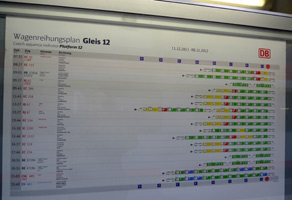 |
|
|
Train formation poster or Wagenstandsanzeiger, on a German station platform, showing where along the platform each car of a train will stop, so you can be waiting in the right place when your train comes in! |
-
Language problems?
First-time visitors often think this will be a problem, but it hardly ever is. At stations, signs are usually in English as well as German, or they use easy-to-understand pictograms. On-train announcements on long-distance trains are often made in English as well as German.
-
Food & drink on German trains
Most long-distance trains have at least a bistro car serving tea, coffee, wine, beer & snacks from a counter, with some tables nearby if you'd want to eat and drink in the bistro car rather than take it back to your seat. See sample ICE bistro menu. Many German long-distance trains have a proper sit-down waiter-service restaurant car. In first class on ICE you'll often be asked if you want to order food or drink, and it will be brought and served at your seat.
Alternatively, feel free to bring your own food and drink (even a bottle of wine, if you like) onto the train, there's no rules against that on the rails.
-
Luggage on trains
There are no baggage fees or weight limits, and you don't check your bags in, you simply take them with you onto the train, placing them on the racks at the end of each car or amongst the seats, or above your head. It's usually possible to keep all your bags in sight. More about luggage on trains.
-
Should you reserve a seat or not?
Reserving a seat is optional on most German trains. You can add a reserved seat to your booking for €5.50 2nd class or €6.90 1st class.
If you don't reserve, you simply sit in any empty unreserved seat. Small LED displays above each seat show which seats are reserved between which stations, and which seats are free. Travelling alone, middle of the day, mid-week in February, you'll have plenty of seats to choose from. But a family group, travelling on a Friday afternoon in July would be well advised to reserve seats. And for any long journey it's best to be on the safe side and reserve.
You can make a seat reservation separately (i.e. after buying your ticket) by going to int.bahn.de, clicking in the from or to field to open the parameters panel, set up an enquiry and run it by clicking Book seat only.
-
On the seat reservation display for each seat:
ggf. reserviert - this means the train's on-board reservation system hasn't been updated with the latest information from the main DB reservation system. Usually all of the seats show this message if this happens. Seat reservations are still valid, but cannot be shown on the LED displays, so you can sit in these seats but you could be asked to move if someone shows up with a reservation.
ggf. freigeben - this is a last-minute reservation seat. You can sit in it if you like, but will have to move if someone shows up with a reservation.
bahn.comfort - travellers holding a frequent traveller BahnCard have priority for these seats. You can sit in these seats but someone with a BahnCard may show up and claim it. Though how they'd know you didn't have a BahnCard and so ask you to move is another question!
Schwerbehinderte means that seat is reserved for people with disabilities.
-
First class lounges at stations
There are lounges for holders of certain types of first class ticket at Berlin, Bremen, Dresden, Düsseldorf, Frankfurt am Main, Frankfurt Main Airport, Hamburg, Hanover, Cologne, Leipzig, Mannheim, Munich, Nuremberg, Stuttgart. Follow the signs to the DB Lounge. They're typically open 07:00-21:00 daily, search int.bahn.de for details. The lounges offer complimentary tea, coffee, soft drinks, beer & snacks. Unfortunately, only holders of expensive 1st class Flexpreis tickets get lounge access, you don't get access with 1st class Sparpreis or Super Sparpreis fares or 1st class Interrail or Eurail passes.
-
Left luggage at stations
All German stations except the smallest have left-luggage lockers in various sizes, up to suitcase-sized. More information on left luggage lockers & prices.
-
Bicycles
Bikes can be carried on all German trains if semi-dismantled & placed in a bike bag, they then travel as ordinary luggage.
Undismantled bikes are carried on most suburban & regional trains, you need a Bicycle Day Ticket (Fahrradtageskarte) which you can buy online at int.bahn.de (use the site search to find it) or at stations for a few euros.
Undismantled bikes are also carried on most InterCity trains, ICE-T & ICE4 trains for a fee as these have been fitted with bike racks, prior reservation required. Undismantled bicycles are not carried on high-speed ICE trains other than ICE-T & ICE4.
To find a train that takes bikes, go to int.bahn.de, click in the from field to open the details panel and select Bicycle transport possible.
To book yourself and your bike on a train in Germany, go to int.bahn.de, click in the from field to open the details panel, click on Passenger, bicycles and add a bicycle to the booking. For more information, see the bicycles by train page.
-
Dogs & pets
Dogs can be taken on all German trains, sometimes free, sometimes for a small fee. For more information, see the dogs & pets page.
-
Where to wait on the platform
At major German stations there's usually a train composition poster (Wagenstandsanzeiger, see photo here) on each platform which tells you which sector to stand in on the platform for your car number when the train comes in. The same information is shown on the platform departure indicators, as you can see in the photo below, taken at Cologne Hbf.
Each platform is divided into sectors, at Cologne Hbf it's A to G. I was booked in car 28 on the 13:42 to Brussels, cars 28 & 29 are first class (as shown by the yellow stripes), so I went to wait near the sector E sign on the platform.
Platform departure indicator.
Places not served by the main rail network
-
Neuschwanstein, Germany's fairytale castle: See details here.
-
Eagles's Nest: See details here.
Guidebooks
Take a good guidebook. For independent travel, the best guidebook is either the Lonely Planet or Rough Guide. Both guidebooks provide an excellent level of practical information and historical and cultural background. You won't regret buying one!
Buy in the UK from Amazon.co.uk
Or buy in the USA from Amazon.com
Or buy the Lonely Planets from the Lonely Planet website, with shipping worldwide. Alternatively, you can download just the chapters or areas you need in .PDF format from the Lonely Planet Website, from around £2.99 or US$4.95 a chapter.
Holidays & breaks by train
 Railbookers,
railbookers.co.uk
Railbookers,
railbookers.co.uk
If you want to tour Germany by train, with all your train reservations and hotels sorted for you, contact rail travel specialists Railbookers and they'll create the best rail holiday for you, hassle-free. They take good care of their clients and get a lot of repeat business. They have offices in the UK, USA & Australia.
![]() UK call 0207 864 4600,
www.railbookers.co.uk.
UK call 0207 864 4600,
www.railbookers.co.uk.
![]() US call free 1-888-829-4775,
see website.
US call free 1-888-829-4775,
see website.
![]() Canada call free 1-855-882-2910,
see website.
Canada call free 1-855-882-2910,
see website.
![]() Australia call toll-free 1300 971 526,
see website.
Australia call toll-free 1300 971 526,
see website.
![]() New Zealand call toll-free 0800 000 554 or
see website.
New Zealand call toll-free 0800 000 554 or
see website.
 Byway,
byway.travel
Byway,
byway.travel
Byway (byway.travel) is a UK-based eco-holiday firm with a 5-star TrustPilot rating. If you're nervous about booking train travel yourself, they'll book a London-Germany trip for you as a package, including hotels, starting from any British station you like.
To see pre-configured packages from London to Germany, use the journey planner on their website.
Or they can build a trip to your requirements, call 01692 660805 (open 09:00-17:00 Monday-Friday, from outside the UK call +44 1692 660805) or email them or use this contact form. Please say you heard about them from Seat 61.
Byway includes package protection, a 100% Covid refund guarantee, free disruption & re-planning and on-demand WhatsApp support while you're away.
Discount for Seat 61 users: Use discount code SEAT61OFF to get £61 off a Byway trip booked before 31 March 2026.
 Tailor
Made Rail,
tailormaderail.com
Tailor
Made Rail,
tailormaderail.com
Tailor Made Rail can arrange tours of Germany by train based on your own requirements, they welcome complex itineraries. As it's a package, they'll take care of you if anything happens on one part of the trip, for example, a national strike. They're TTA-protected, which is similar to ATOL's protection for air travel.
Call their dedicated seat61 phone line 020 3778 1461 and quote seat 61 when booking. From outside the UK call +44 20 3778 1461. Lines open 09:00-17:30 Monday-Friday. Their website is www.tailormaderail.com/destinations/germany.
Recommended hotels
Here are my suggested hotels conveniently located for arrival by train in key German cities, all with good or great reviews. You are unlikely to be disappointed by any hotel scoring over 8.0 out of 10 on Booking.com.
In Berlin
-
An excellent and relatively inexpensive choice next to Berlin Hbf is the InterCity Hotel Berlin Hbf, only 200m from the station main entrance, ideal for an overnight stop. It's a favourite of mine and it gets great reviews. You can easily stroll past the Reichstag building to the Brandenburg Gate in 17 minutes, and of course Berlin Hbf is a local transit hub making it easy to reach other parts of Berlin.
-
Also right next to Berlin Hbf and a step up in quality and cost, the 5-star Steigenberger Hotel am Kanzerlamt is on the main square in front of the station. It's a guest favourite, I've eaten in the bar here, it's a classy place which won't disappoint (Steigenberger hotels usually don't!).
-
For something cheaper but still with great reviews, the reliable inexpensive Motel One Berlin-Hauptbahnhof is on the north side of the station.
-
Finally, if you really want to push the boat out with somewhere special, the famous Hotel Adlon Kempinski Berlin is right next to the Brandenburg Gate, a 17 minute walk or 5 minute taxi ride south of the station.
In Cologne
-
The good & inexpensive Ibis Hotel Köln-am-Dom is ideal as it's part of Cologne Hbf station itself, the entrance is left of the station entrance, many rooms have a cathedral view.
-
Also near the station with good reviews are the Breslauer Hof Am Dom, Hotel Domspitzen, CityClass Hotel Europa am Dom, Hilton Cologne, Excelsior Hotel Ernst am Dom.
In Frankfurt
-
Hotels next to Frankfurt (Main) Hbf with good or great reviews include the Flemings Hotel Frankfurt-Central & Hotel Hamburger Hof, both of which I have stayed at and can recommend, I'd go with Flemings Express on balance, for carpeted rooms and a good breakfast buffet. Both hotels are just across the road from the station's northern (platform 24) side exit. You could also try The Frankfurt and the inexpensive Hotel Topas.
In Hamburg
-
If you walk out of Hamburg Hbf's main eastern exit, you'll find a row of good hotels lined up in front of you on the opposite side of the Kirchenallee. The pick of these is the excellent 4-star Hotel Reichshof Hamburg, across the road and to the left with art deco-based design and great reviews. It has its own restaurant for lunch or dinner, although I'd still be tempted to try the beer & traditional German food at Nagel's bar, 150m south along the Kircheallee, restaurant-kneipe-hamburg.de.
-
The Hotel Europaischer Hof is another good choice and directly in front of you across the road when you walk out of the station. Other hotels next to Hamburg Hbf with good reviews include the 5-star Hotel Continental Novum (to the right of the Europaischer), Hotel Furst Bismarck (to the right of the Continental Novum), and the Hotel Atlantic Kempinski.
-
If you'd prefer a hotel right in the city centre, the Henri Hotel Hamburg Downtown is 5 minutes walk from the station on the city side, and gets really great reviews.
-
If you're on a budget, private rooms in the A&O Hotel start at around £33 for one person or £49 for two people booked at www.hostelworld.com. The A&O is an 11-minute 900m walk south of Hamburg Hbf, see walking map. Also try the innovative Cab20 capsule hotel, a 550m 6-minute walk from the station, see walking map.
In Munich
-
Affordable hotels right next to Munich Hbf with good or great reviews include the reliable Eden Hotel Wolff or the NH Collection München, both directly across the road from the station's north side exit, ideal for an overnight stop between trains. I've used the Hotel Wolff myself.
-
Also consider the more upmarket 25 Hours Hotel The Royal Bavarian, Excelsior by Giesel or Mercure München City Center, all a stone's throw from the station with great reviews.
-
If you want to push the boat out, the luxurious 5-star Sofitel Munich Beyerpost is right outside the station's south side exit, located in the former Royal Bavarian Post Office building dating from 1896-1900. It comes complete with a spa with massage service and sauna.
-
If you're on a budget, the Wombat's Hostel Munich is close to the station's south side exit with private rooms & dorm beds, with good reviews.
 Booking.com
for hotels
Booking.com
for hotels
I generally use Booking.com for hotels for 3 reasons:
(1) It keeps all my hotel bookings together in one place;
(2) I've come to trust Booking.com's review scores;
(3) Booking.com usually offers a clearly-marked Free cancellation option.
Free cancellation means you can secure hotels risk-free even before trains open for booking, and if necessary change those bookings if your plans evolve.
If I'm only staying a night or two, I look for a hotel near the station to make arrival & departure easy. You can enter the station name (e.g. Berlin Hbf) as search location. If staying longer, I look for a hotel close to the sights, entering the name of a city attraction as the search location, then using map view.
I then look for a hotel with a review score of 8.0 or over, any hotel scoring over that won't disappoint.
AirBnB: Airbnb.com
www.airbnb.com began in 2008 when two designers who had space to share hosted three travellers looking for a place to stay. AirBnB is a platform which connects hosts with guests, so you can now book a room in people's homes, or an apartment, flat or house which people want to rent out. It can be nicer than a hostel, cheaper than many hotels.
Backpacker hostels: Hostelworld.com
www.hostelworld.com: If you're on a tight budget, don't forget about backpacker hostels. Hostelworld offers online booking of cheap private rooms or dorm beds in backpacker hostels in Paris and most other European cities at rock-bottom prices.
Travel insurance & other tips
Always take out travel insurance
You should take out travel insurance with at least £1m or preferably £5m medical cover from a reliable insurer. It should cover trip cancellation and loss of cash & belongings up to a reasonable limit. These days, check you're covered for covid-19-related issues, and use an insurer whose cover isn't invalidated by well-meant but excessive Foreign Office travel advice against non-essential travel. An annual policy is usually cheapest even for just 2 or 3 trips a year, I have an annual policy with Staysure.co.uk myself. Don't expect travel insurance to bail you out of every missed connection, see the advice on missed connections here. Here are some suggested insurers, I get a little commission if you buy through these links, feedback always welcome.
![]() www.staysure.co.uk
offers enhanced Covid-19 protection and gets 4.7 out of 5 on
Trustpilot.
www.staysure.co.uk
offers enhanced Covid-19 protection and gets 4.7 out of 5 on
Trustpilot.
![]() www.columbusdirect.com is also a well-know brand.
www.columbusdirect.com is also a well-know brand.
![]() If you live in the USA try
Travel Guard USA.
If you live in the USA try
Travel Guard USA.
Get an eSIM with mobile data package
Don't rely on WiFi, download an eSIM with a European mobile data package and stay connected. Most newer mobile phones can download a virtual SIM including iPhone 11 & later, see device compatibility list. There's no need to buy a physical SIM card! Maya.net is a reliable eSIM data retailer with a 4.5 out of 5 Trustpilot rating and a range of packages including unlimited data.
Get a Curve card for foreign travel
Most banks give you a poor exchange rate then add a foreign transaction fee on top. A Curve MasterCard means no foreign transaction fees and gives you the mid-market exchange rate, at least up to a certain limit, £500 per month as I write this. The money you spend on your Curve card goes straight onto one of your existing debit or credit cards. And you can get a Curve card for free.
How it works: 1. Download the Curve app for iPhone or Android. 2. Enter your details & they'll send you a Curve MasterCard - they send to the UK and most European addresses. 3. Link your existing credit & debit cards to the app, you can link up to two cards with the free version of Curve, I link my normal debit card and my normal credit card. 4. Now use the Curve MasterCard to buy things online or in person or take cash from ATMs, exactly like a normal MasterCard. Curve does the currency conversion and puts the balance in your own currency onto whichever debit or credit card is currently selected in the Curve app. You can even change your mind about which card it goes onto, within 14 days of the transaction.
I have a Curve Blue card myself, it means I can buy a coffee on a foreign station on a card without being stung by fees and lousy exchange rates, just by tapping the Curve card on their card reader. The money goes through Curve to my normal debit card and is taken directly from my account (in fact I have the Curve card set up as payment card on Apple Pay on my iPhone, so can double-click my phone, let it do Face ID then tap the reader with the phone - even easier than getting a card out). I get a little commission if you sign up to Curve, but I recommend it here because I think it's great. See details, download the app and get a Curve card, they'll give you £5 cashback through that link.
Get a VPN for safe browsing. Why you need a VPN
When travelling you may use free public WiFi which is often insecure. A VPN encrypts your connection so it's always secure, even on unsecured WiFi. It also means you can select the geographic location of the IP address you browse with, to get around geoblocking which a surprising number of websites apply. See VPNs & why you need one explained. ExpressVPN is a best buy with a 4.7 out of 5 Trustpilot ranking which I use myself - I've signed up as an ExpressVPN affiliate, and if you go with expressvpn.com using this link you should see a special deal, 3 months free with an annual subscription. I also get some commission to help support this site.
Carry an Anker powerbank
Tickets, reservations, hotel bookings and Interrail or Eurail passes are often now held on your mobile phone. You daren't let it run out of power, and you can't always rely on the phone's internal battery or on being near a power outlet. I always carry an Anker powerbank which can recharge my phone several times over. Buy from Amazon.co.uk or buy from Amazon.com.
Touring cities? Use hill walking shoes!
One of the best things I've done is swap my normal shoes for hill-walking shoes, in my case from Scarpa. They're intended for hiking across the Pennines not wandering around Florence, but the support and cushioning for hiking works equally well when you're on your feet all day exploring foreign cities. My feet used to give out first and limit my day, now the rest of me gives up before they do!


